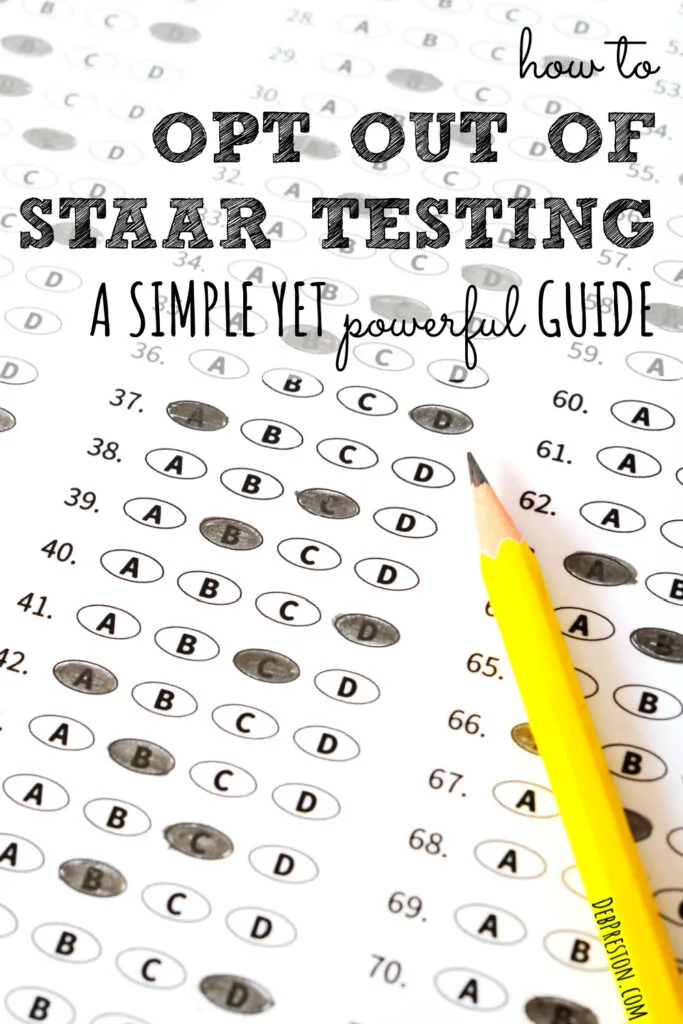So…you’re wondering how to opt out of STAAR testing.
Maybe you’re fed up with teachers teaching to test scores.
Or maybe you’re trying to save your child from unnecessary stress.
Heck, maybe you feel STAAR testing is just another example of an overreaching government.
No matter what reason brings you to this page, I’ve got what you need! Because your child’s educational decisions should ultimately land with you, their parent.
Understanding STAAR Testing
The STAAR (State of Texas Assessments of Academic Readiness) is a standardized testing program in Texas. It’s designed to measure students’ knowledge and skills in core subjects such as Reading and Language Arts (RLA), mathematics, science, and social studies.
The purpose of the STAAR assessment is to ensure students are learning the necessary material in each grade level and are prepared to advance to the next grade. STAAR scores are also used to determine a school’s “rating” and subsequent funding.
The STAAR assessments are administered by the Student Assessment Division and are based on the state’s curriculum standards. This means that the STAAR exams help gauge the effectiveness of Texas educational programs and provide feedback to students, teachers, and parents.
You might be concerned about the impact of standardized tests on your child’s education, and you’re not alone.
Some parents consider opting out of the STAAR exams to avoid the stress and pressure associated with testing. Additionally, many teachers are at odds with the testing, stating they’re forced to teach to test scores rather than to teach with a more balanced and developmentally-appropriate approach.
While state law does not explicitly allow students to opt out of these tests, parents can work with their child’s school to reach alternative solutions or make accommodations.
STAAR Testing and School Curriculum
A big reason many parents dislike STAAR testing is that they feel curriculums are now catered to passing the STAAR test, rather than focused on a balanced and developmentally-appropriate education. The truth is that STAAR assessments do play a significant role in the curriculum and instruction in Texas schools.
Both STAAR assessments and your child’s teachers attempt to align with the state-approved standards for each subject and grade level, known as Texas Essential Knowledge and Skills (TEKS). So in many ways, testing and curriculum content should be aligned.
However, STAAR scores are also used to monitor teachers’ performance and can be utilized to calculate their merit pay or even justify firing them. Teachers also receive pressure from their schools to ensure the school receives a high rating and subsequent funding.
This motivates teachers to focus less on teaching broader topics within TEKS and more on teaching the answers to common STAAR test questions. So while STAAR assessments begin with good intentions, they often result in unintended consequences.
Opting Out from STAAR Testing
Okay, now that you have a basic understanding of STAAR assessments, let’s talk about how to opt out of it! If you’re a parent considering opting out of STAAR testing for your child, there’s a process you can follow to formally refuse the assessment.
First, you should inform the school that you intend to opt out of the assessment. Remember, you’re not asking for permission but rather informing them of your decision.
A formal opt-out letter can help you to express and officially document your stance on the matter. You can download this Master Opt-Out letter and customize it according to your needs.
Once you’ve submitted your letter, it’s essential to maintain open communication with your child’s teachers and administrators throughout the opt-out process. A little patience and teamwork can go a looooong way in ensuring your child’s education remains the top priority for everyone involved.
Make sure you gather all necessary information from the school regarding your child’s curriculum, assignments, and other educational alternatives they can engage in during the assessment period. These alternatives can help to minimize any disruptions to their learning progress.
Finally, don’t forget to talk to other parents at your school!
They may also be considering the opt-out route or have valuable experiences to share from their own opt-out journeys. Building a community of supportive and informed parents can make the entire process smoother and more successful for everyone involved.
Understanding the STAAR Testing Window
Now that you know how to opt out of STAAR testing, it’s important to know when to do it.
The STAAR testing window refers to the specific dates set by the Texas Education Agency (TEA) for schools to administer the exam. The testing window varies slightly from year to year but usually covers a few weeks in the spring and fall.
During this time, your child’s school will schedule testing days for different grade levels and subjects. To stay updated, you can check the TEA website or your school’s calendar for the most accurate information.
If you decide to opt out of the STAAR test, it’s important to let your child’s school know your choice with as much advance notice as possible. This will mean more time to process your request, which usually equates to less stress.
Understanding State Law and Federal Laws
But…what if it’s not that easy? What if your child’s school informs you that taking the STAAR test is required by state law?
As you navigate the process of opting out of STAAR testing, it’s essential to understand the Texas Education Laws and federal obligations related to standardized testing. This will give you a better sense of your rights and options regarding this matter.
State law is governed by the Texas Education Code, which defines various aspects of the educational system in Texas, including standardized testing requirements. Each school district and its campuses are responsible for administering these tests based on the guidelines set forth by the Texas Education Agency.
The Texas Education Agency (TEA) is a state agency responsible for administering the public school system, including enforcing the policies and guidelines related to standardized tests.
Although the TEA oversees the overall implementation of these policies, it’s essential to remember that each school district has autonomy in establishing its specific testing processes. While there’s no specific opt-out provision within the Texas Education Code, you can still approach your child’s school district with your decision to opt out.
Federal laws play a role in standardized testing as well.
The Every Student Succeeds Act (ESSA) requires that states must regularly test students in specific subjects and grades. While the ESSA doesn’t address opting out specifically, states and local education agencies do have to consult with stakeholders to make decisions related to assessment policies.

Implication of Opting Out on Student’s Performance
When you choose to opt your child out of the STAAR testing, it’s important to consider how this decision may affect them. Opting out can have both positive and negative impacts on a student’s performance.
On one hand, avoiding the pressure and stress associated with these tests might help your child focus more on their studies and other activities. This could lead to a more balanced educational experience that fosters a love for learning rather than just striving for high test scores.
On the other hand, opting out might lead to a lack of valuable assessment data for your child’s teachers.
Assessments like the STAAR can help educators to identify gaps in a student’s understanding, enabling them to tailor instruction to better meet their needs. Without this data, it may be more challenging for teachers to pinpoint areas where your child might require extra support.
It’s important to remember, however, that while standardized tests are designed to measure students’ skills and knowledge in certain subject areas, they are not the only indicators of a student’s success or potential.
And finally, a lot rides on how you opt out.
I’ve seen parents handle the logistics and stress of opting out of STAAR testing to the point that their children didn’t have to do a thing! I’ve also witnessed opt-out battles where either the school or the parent pushed stress levels unnecessarily high, resulting in the child having to carry the stress and/or advocate boldly for themselves at the time of testing.
Know your child. Make sure you don’t cause them more stress in your attempt to cause them less stress.
Impact of STAAR Test Absence on Attendance
Unfortunately, opting out of STAAR testing can have more implications than just the testing itself. For starters, missing STAAR testing can result in the school recording absences for your child.
Schools use attendance data for various purposes, such as tracking student progress and ensuring they meet requirements for promotion to the next grade level. For this reason, you’ll want to be careful to factor STAAR testing absences into your child’s overall absence count for the school year.
You’ll want to keep in mind that truancy charges can be a consequence of repeated or unexcused absences from school.
If you choose to opt out of STAAR testing and are not following proper procedures, the state of Texas might view it as a violation of state attendance laws. In some cases, this could lead to truancy charges, fines, or even court intervention.
It’s crucial to communicate your intentions with the school to avoid these unnecessary complications.

STAAR Exams and High School Graduation
Another implication to keep in mind is that in Texas, high school students need to pass five end-of-course (EOC) exams in order to graduate.
These exams cover Algebra I, Biology, English I (including reading and writing in a single exam), English II (including reading and writing in a single exam), and U.S. History. These exams are a part of STAAR testing and many schools will inform you are a nonnegotiable requirement for high school graduation.
However, that’s just not true! Passing all five EOC assessments is one way a student can meet the requirements for high school graduation from public schools, but it’s not the only way.
The Texas Parents’ Educational Rights Network notes that high school students can use substitute assessments, Individual Graduation Committees (IGC), Credits Verification and Evaluation Programs (CVEP), or homeschool graduations to meet this requirement. Check out their website for further guidance on each of these alternatives.
Special Cases in STAAR Testing
When it comes to STAAR testing, there are certain special cases you’ll want to be aware of, especially if your child requires special education services or accommodations. In this section, we’ll discuss some of these cases and provide guidance on navigating them.
If your child has a disability and currently receives special education services, they may be eligible for accommodations during the STAAR testing process.
Accommodations are intended to help level the playing field for students with disabilities, ensuring they have the same opportunity to demonstrate their knowledge and skills as their non-disabled peers. Some examples of accommodations include extra time, modified instructional materials, or access to assistive technology.
To determine what accommodations your child may need, schools typically consult the ARD (Admission, Review, and Dismissal) Committee, a group consisting of school personnel, the parent or guardian, and other relevant stakeholders.
This committee works together to devise an Individualized Education Program (IEP) tailored to the specific needs of eligible students. The IEP outlines the appropriate accommodations and supports that will help your child succeed during the STAAR test and throughout their education.
It’s crucial that you communicate with your child’s school and stay informed about their IEP. This ensures you’re aware of any accommodations they may receive during STAAR testing and provides you with the opportunity to advocate for your child’s needs.
In addition to standard accommodations, there are accommodation resources available that help guide educators in selecting and implementing the right support for each student.
Examples of these resources include the Texas Accommodation Task Force videos and the Students with Disabilities section of the Texas Education Agency’s website. Exploring these resources can be beneficial not only for teachers but also for parents who wish to better understand the process.
Finding Support in Opting Out
If you’re a parent or guardian considering opting your child out of STAAR testing, it’s essential to find support from like-minded individuals. Engage with other parents, teachers, educators, and even union members who understand your concerns and share the same goal of making informed decisions about standardized testing.
Begin by reaching out to fellow parents at your child’s school or within your community. You can start discussions with them to learn about their thoughts and experiences related to STAAR testing and opting out.
Social media platforms like Facebook groups or parenting forums can be a beneficial resource for connecting with others who share your perspective.
I’ve found Texans Take Actions Against STAAR to be an incredibly helpful Facebook group on the topic. Similarly, the Texas Parents’ Educational Rights Network website tackles loads of common questions and issues you might encounter when attempting to opt out of STAAR testing.
Next, approach the teachers and educators at your child’s school. They may offer valuable insights and advice, thanks to their direct involvement in the educational process.
Be respectful and friendly in your approach, as educators might have diverse opinions on standardized testing. Some teachers may be supportive of your decision, while others might remain neutral or even disagree.
Connecting with union members can also be a helpful support source.
Teachers’ unions frequently advocate for better working conditions and students’ best interests, which may include questioning the effectiveness of standardized testing like STAAR. Research local or state-level teachers’ unions and engage with their members or representatives to gain a broader perspective on opting out.

And there you have it….how to opt out of STAAR testing!
You’re not the first one to opt out and you certainly won’t be the last. You’re doing what you feel is best for your child and we’re here for it! Go, you!!
Frequently Asked Questions
What are the steps to opt out of STAAR testing in Texas?
To opt out of STAAR testing in Texas, you should inform the school of your decision. You can use a customized Master Opt-Out letter to do this.
Is it possible for homeschool students to skip STAAR tests?
Yes, the state of Texas does not require homeschool students to take the STAAR tests. These tests are designed for students in public schools, and homeschool students are exempt from the testing requirements.
What are the consequences of not taking the STAAR test?
The consequences of not taking the STAAR test may vary depending on a student’s grade level and individual circumstances. It’s best to discuss your concerns with the campus principal and explore possible alternatives or accommodations.
Do students need to pass STAAR to advance to the next grade?
In some cases, students may need to pass STAAR tests, or alternative tests, to advance to the next grade. This primarily applies to students in grades 5 and 8.
Read this post in its entirety to learn what alternative options are available to you!
What is the opt-out movement in relation to STAAR testing?
The opt-out movement is a grassroots effort by parents, educators, and students who believe that standardized testing, such as the STAAR test, is not an accurate measure of academic ability and has negative consequences on the education system. Many within this movement aim to change the current testing system or opt out of testing altogether.
When are the STAAR testing dates for 2025?
TheTexas Education Agency has not yet released STAAR testing dates for 2025. Typically, they announce testing dates closer to the start of the school year.

P.S. Could you use some help with your stress levels? Download A Practical Guide to Stress | 17 Tricks to Take Control of Stress Today to help you develop a game-changing stress management plan. It’s free! Get yours HERE.
Disclosure: While all opinions are our own, we are a participant in the Amazon Services LLC Associates Program and other affiliate advertising programs, designed to provide a means for us to earn fees by linking to Amazon.com and affiliated sites, at no additional cost to you.



